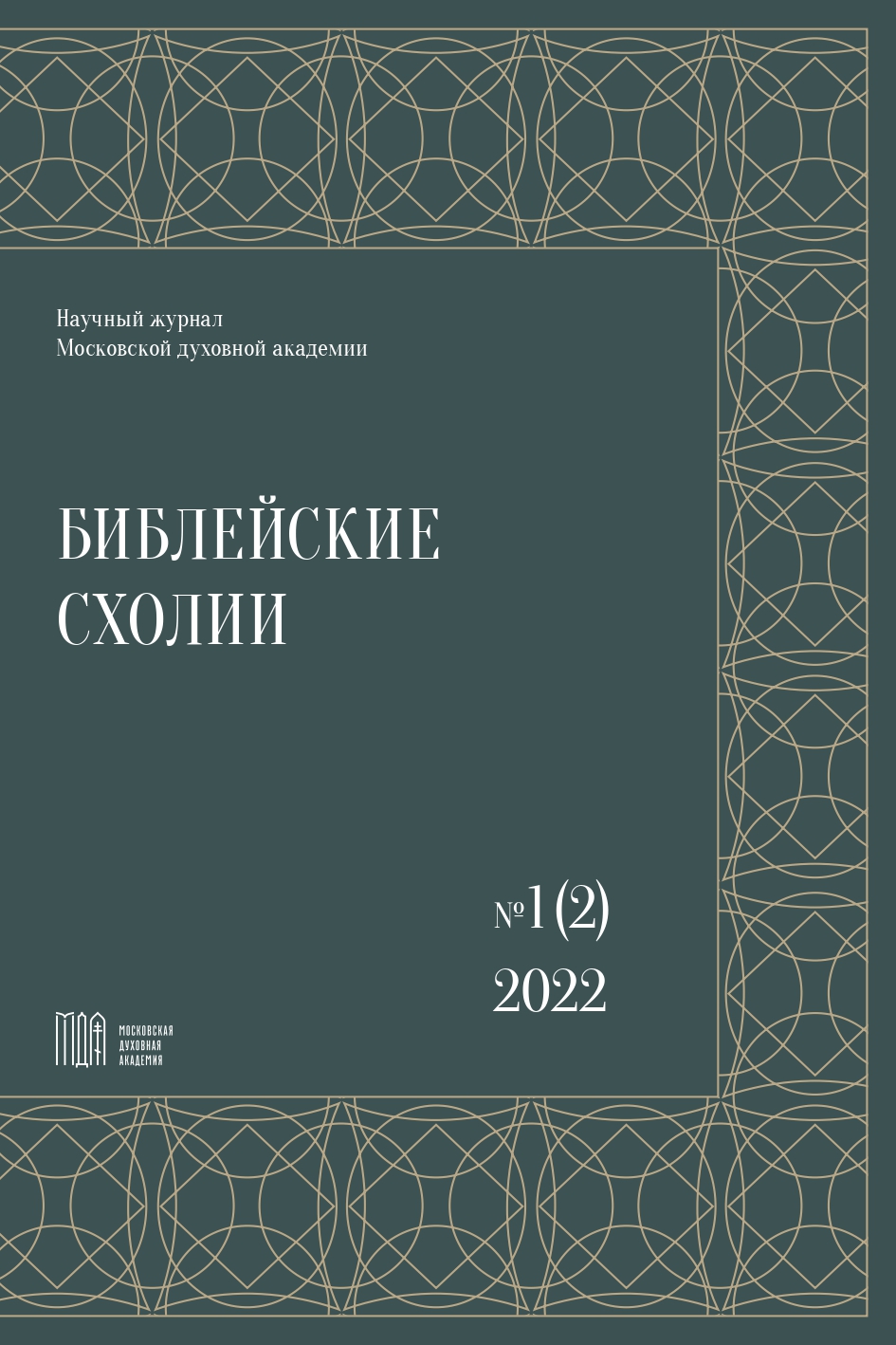The covenant of the Lord with David in Psalm 132 (131)
DOI:
https://doi.org/10.31802/BSCH.2022.2.1.005Keywords:
Psalter, psalm, David, testament, Messiah, exegesis, Ancient IsraelAbstract
Psalm 132 (131 according to the Septuagint) is one of the most striking poetic biblical hymns, glorifying the power of the king in Zion. Its content resembles the prayer of Solomon during the consecration of the temple (1 Kings 8, 25; 9, 4–5), and his presence in the collection of “Songs of Ascend” (Psalm 120 — 134) refers to post-exilic liturgical use. Many commentators interpret this psalm as a prophecy about the unconditional inviolability of the David’s throne, without taking into account the possible historical prerequisites for the appearance of this hymn. In this study I want to analyze the process of re-interpreting the key expressions of the psalm associated with the “covenant” in the different periods of the Israel history. The historical-philological method of exegesis witch I use allows to see at least two key thoughts that are explicitly or implicitly present in the psalm. Firstly, the author of the psalm writes about the requirements for the descendants of David, under which they can pretend to the eternity of their reign. Secondly, the Lord’s promise to settle in Zion should be considered as an addition to the “covenant” with David. So, this means that any “messianic” interpretations of the psalm 132 (131) should take into account the high role of the temple, which in the post-exilic period was no less important than the expected Messiah.
Downloads
References
Q5 Psalms a. Bellingham (Wash.): Lexham Press, 2010.
Biblia Hebraica Stuttgartensia: SESB Version. Stuttgart: German Bible Society, 2003.
Stec D. M. The Targum of Psalms. Collegeville (Minn.): A Michael Glazier Book, 2004. (The Arama ic Bible; vol. 16).
Abraham Ibn Ezra’s Commentary on Books 3–5 of Psalms / trans. and annotated by N. H. Strickman. New York (N. Y.): Touro College Press, 2016.
Иоанн Златоуст, свт. Беседы на псалмы. М.: ПСТБИ, 2003.
Феодорит Кирский, блж. Изъяснение псалмов. М.: ИС РПЦ, 2004.
Техилим. Техила ЛеДавид / пер. М. Левинова. Иерусалим: Бехор Барух, 2008.
Книга Восхвалений с толкованием раби Давида Кимхи / пер. Ф. Гурфинкель. Т. 2. Иерусалим, Запорожье: Еврейская книга, 2008.
Генри М. Толкование книг Ветхого Завета. Псалмы, Притчи Соломоновы, Книга Екклесиаста, Песни Песней Соломона. [Б. г.]: Dutch Reformed Tract Society, 2007.
Разумовский Григорий, прот. Объяснение священной книги Псалмов. М.: ПСТБИ, 2002.
Angel H. The Eternal Davidic Covenant in II Samuel Chapter 7 and Its Later Manifestations in the Bible // Jewish Bible Quarterly. 2016. Vol. 22. № 2. P. 83–90.
Auwers J. M. Le Psaume 132 Parmi les Graduels // Revue Biblique. 1996. Vol. 103. № 4. P. 546–560.
Avioz M. The Davidic Covenant in 2 Samuel 7: Conditional or Unconditional? // The Ancient Near East in the 12th–10th Centuries BCE: Culture and History / ed. G. Galil et al. Munster: Ugarit-Verlag, 2012. P. 43–51.
Barbiero G. Psalm 132: A Prayer of «Solomon» // The Catholic Biblical Quarterly. Vol. 75. № 2. P. 239–258.
Berlin А. Psalm 132: A Prayer for the Restoration of Judah // Marbeh Hokmah: Studies in the Bible and the Ancient Near East in Loving Memory of Victor Avigdor Hurowitz. Winona Lake (Ind.): Eisenbrauns, 2015. Р. 65–72.
Booij T. Psalm 132: Zion’s Well-Being // Biblica. Vol. 90. № 1. P. 75–83.
Bratcher R. G. Reyburn W. D. A Translator’s Handbook on the Book of Psalms. New York (N. Y.): United Bible Societies, 1991. (UBS Handbook Series).
Dahood M. Psalms III: 101–150. Introduction, Translation, and Notes with an Appendix. New Ha ven (Conn.); London: Yale University Press, 2008. (Anchor Yale Bible; vol. 17A).
Delitzsch F. Die Psalmen. Gießen; Basel: Brunnen Verlag, 1984.
Gunkel H. Die Psalmen. Göttingen: Vandenhoeck & Ruprecht, 2011.
Hossfeld F.-L., Zenger E. Psalms 3: A Commentary on Psalms 101–150. Minneapolis (Minn.): Fortress Press, 2011.
Human D. J. Psalm 132 and its compositional context(s) // Scriptura. 2017. № 116. P. 75–92.
Jeremias J. Lade und Zion: Zur Entstehung der Ziontradition // Probleme Biblischer Theologie / festschrift für G. von Rad. Munich: Kaiser, 1971. P. 183–198.
Knoppers G. N. Ancient Near Eastern Royal Grants and the Davidic Covenant: A Parallel? // Journal of the American Oriental Society. 1996. Vol. 116. № 4. P. 670–697.
Knowles M. D. The Flexible Rhetoric of Retelling: The Choice of David in the Texts of the Psalms // The Catholic Biblical Quarterly. 2005. Vol. 67. № 2. P. 236–249.
Knowles M. D. To Sanction and to Subvert: The Reuses of Psalm 132 in the Hebrew Bible // Prayers and the Construction of Israelite Identity / ed. S. Gillmayr-Bucher, M. Häusl. Atlanta (Ga.): SBL Press, 2019. (Ancient Israel and Its Literature; vol. 35). P. 189–202.
Koehler L. et al. The Hebrew and Aramaic Lexicon of the Old Testament. Vol. 3. Leiden: E. J. Brill, 1996.
Kraus H.-J. Psalmen. T. 2: Psalmen 60–150. Neukirchen-Vluyn: Neukirchener Verlag, 1978. (Biblischer Kommentar Altes Testament).
Kruse H. Psalm CXXXII and the Royal Zion Festival // Vetus Testamentum. 1983. Vol. 33. № 3. P. 279–297.
Laato A. Psalm 132 and the Development of the Jerusalemite/Israelite Royal Ideology // The Catho lic Biblical Quarterly. 1992. Vol. 54. № 1. Р. 49–66.
Laato A. Psalm 132: A Case Study in Methodology // The Catholic Biblical Quarterly. 1999. Vol. 61. № 1. P. 24–33.
Lange J. P., Schaff P., Moll C. B. et al. A Commentary on the Holy Scriptures: Psalms. Bel lingham (Wash.): Logos Bible Software, 2008.
Leow W. P. Changing One’s Tune: Re-reading the Structure of Psalm 132 as Complex Antiphony // Old Testament Essays. 2019. Vol. 32. № 1. P. 32–57.
Schreiner D. B. Double Entendre, Disguised Verbal Resistance, and the Composition of Psalm 132 // Bulletin for Biblical Research. 2018. Vol. 28. № 1. P. 20–33.
Wendland E. The forms and Functions of Disjunctive Parallelism in the Psalter, with Special Reference to Psalm 132 // Journal for Semitics. 2017. Vol. 26. № 1. P. 123–157.
Downloads
Published
How to Cite
Issue
Section
Categories
License

This work is licensed under a Creative Commons Attribution-ShareAlike 4.0 International License.






